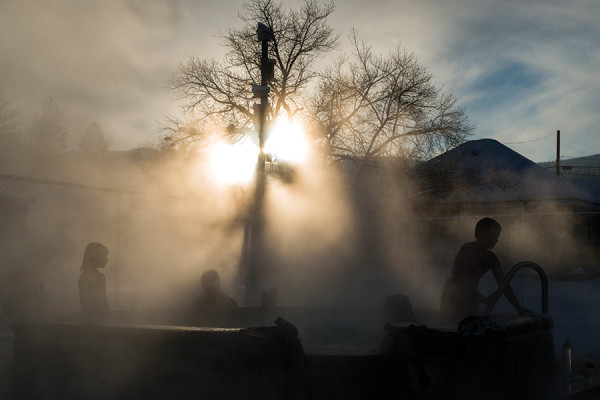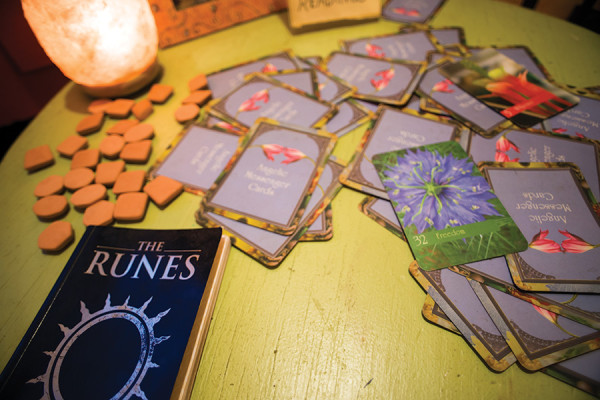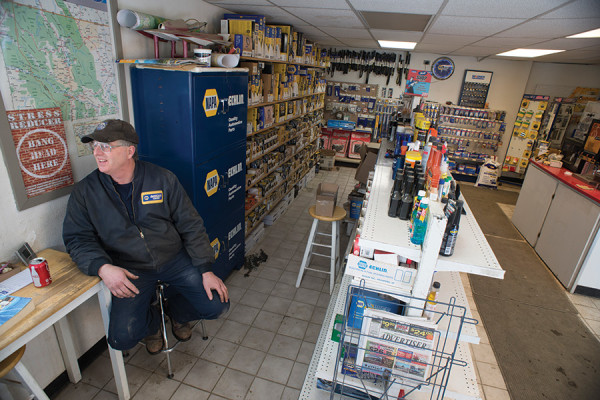Editor’s Note: This story was originally published in the spring edition of Flathead Living magazine.
The community of Hot Springs is just over an hour away from Missoula and Kalispell, but it’s about a half-century and a cell phone tower away from the modern world. As one of the few towns in the country still without cell service, its residents remain divided on whether they want a tower. Yet the fact that this debate exists in 2014 is surprising only until you spend a day there.
After receiving a tarot card reading at the Rainbow Zen organic café and then wandering through the Depression-era Symes Hotel – a surreal gathering place where hippies and spiritual healers mingle with loggers and cattle ranchers – you realize that the lack of cell phone reception barely makes the short list of reasons why Hot Springs feels like a relic from a different era, if not an alternate reality. If anything, cell phones would seem out of place.
“This is a place where people come to check out,” says Paul Stelter, an owner at Alameda’s Hot Springs Retreat. “It’s like living on an island. People don’t really leave. They might leave to go to Costco for a day, but then they come back and stay here for weeks or months.
“It takes a special person to want to live here because you have to want to be quiet.”
Hot Springs was incorporated in 1929, replacing the originally platted town of Pineville, on the Flathead Indian Reservation along a stretch of eastern Sanders County dotted with hot springs, created by subsurface geothermal activity. These waters, considered to be among the most mineral-rich in the world, are known for their healing properties, giving the town its motto: “limp in, leap out.” The population today is roughly 550, though its oddball diversity and penchant for self-sustainability make that figure seem inadequate as an indicative measurement: Hot Springs is simply as big as its people, who defy classification and perform beyond quantification.

Small towns are shriveling up across Montana, either consolidating with nearby municipalities or becoming more dependent in other ways. But Hot Springs remains remarkably self-sufficient for such a tiny community. After all, it’s the type of place that can function contentedly without cell service in a world that’s evermore reliant on smartphones.
“I would be willing to bet you can’t find another community in the country this size with a grocery store, natural food store, lumberyard, medical clinic, airport and hardware store,” Stelter says. “Most don’t even have a grocery store.”
If Stelter were to win that bet, he could thank the minerals in the water and the resolve of the people. And the two go hand in hand, as residents and visitors alike, no matter their spiritual or medicinal beliefs, will tell you that the hot springs give them strength.
Long before trappers and traders began enjoying the area’s waters, traditionally known as the Camas hot springs, American Indians sought out the springs’ healing powers. By the early 20th century, the area had become a highly sought destination for visitors of all kinds, who arrived to both soak in and drink the water. A businessman named Fred Symes constructed the Symes Hotel in 1930 to host the hordes, and the hotel expanded through the 1940s. Then in 1949, the Confederated Salish and Kootenai Tribes held a ceremony to dedicate a newly constructed bathhouse that towered over town. State and tribal officials attended the ceremony, along with famed Olympian Jim Thorpe.
The bathhouse highlighted a boom period for the town. Population soared above 1,000, and at various times there were multiple grocery stores, a sawmill, a car dealership, six bars, a hospital and a movie theater. But when the tribes shut down the bathhouse in 1985, the economic fallout proved severe at a time when other core industries like ranching and timber were struggling. The abandoned skeleton of the bathhouse fell into disrepair and stood as a haunting reminder of better times.
That’s how Leslee and Daniel Smith found the town in the mid-1990s. They were on a road trip from Washington when they passed through and saw a “for sale” sign at Symes. The couple fell in love with the hotel, purchased it in 1996 and then conducted a series of renovations. Today, Symes has three outdoor soaking pools, indoor jacuzzis and private bathing stalls, and its lobby houses an espresso bar and various art exhibits, though most of the hotel looks unchanged from the 1940s. The rooms have no telephones; guests and locals can use the hotel’s pay phone.

Though Symes is the centerpiece, several other places also offer soaking opportunities, harkening back to the town’s heyday before the bathhouse closed nearly three decades ago. There’s a renewed vibrancy in town, with empty storefronts filling up and more people discovering, or rediscovering, this quaint getaway. Adding to the vitality is the Hot Springs Artists Society, which showcases the town’s inordinately large creative community. The society organizes live music each Friday and Saturday night at Symes. And the annual Homesteader Days, slated this year for June 7-9, are unlike any other event around, combining arts and crafts, rodeo, softball, bagpipes, car shows and street dances.
“Good wages are hard to come by,” Mayor Randy Woods says. “A lot of younger people leave.”But measuring a community’s health is a matter of both criteria and perspective. Despite its revival, Hot Springs remains among the poorer municipalities in Montana, with a median household income around $20,000. Yet many residents say they’re proud to work multiple jobs in order to live in a place they love, and cost of living is incredibly low. Nevertheless, the truth remains that jobs are scarce, and in a population trending older it’s a challenge to maintain youth in the workforce.
In addition to the elderly, the mayor says there are a lot of disabled residents, who are drawn to the affordable housing and social services. The town has two senior citizen centers and a solid transportation network for those who can’t drive.
“I know one person who moved here because you can rent a trailer for $300 that cost $600 down in Florence,” Woods says. “If you’re living off $1,200 a month, that goes a long way.”
Woods was elected in 2008 and reelected in 2012. His initial election came on the heels of a tumultuous period for city government. The previous mayor had drawn criticism for hiring her convicted felon boyfriend, who wasn’t allowed to have a driver’s license, as the animal control officer. Residents also voiced concern over her ability to do the job because of vision problems that had worsened to blindness. She eventually stepped down as mayor.
Additionally, the previous police chief made headlines when a district court judge charged him with official misconduct for an incident involving a rifle and then ordered him arrested after he failed to show in court. He did later show up and the charge was dismissed, though Woods, then the fire chief, had a confrontation with him that led Woods to state publicly that he was nervous about the chief carrying a firearm.
But Woods’ tenure has brought smoother times, along with increased efforts to boost the town’s economy, though he says he’s had his fair share of run-ins with the community’s vocal anti-government contingent, including a span when he felt compelled to increase police presence at council meetings. Woods rattles off a long list of ideas to improve his community, as well as a number of improvements already in place. He tells the story of firefighters racing to a fire only to have their truck burst into flames en route. The town now has new fire trucks.
Woods, who is still the fire chief, has also upped the police force from a single officer to three officers capable of providing near-24-hour patrols. The move has both fans and critics. And if you want to voice your opinion, Woods is easy to find. He runs the town’s busy auto repair shop, which sees a steady stream of locals stopping by just to chat.
To spur tourism, Woods wants to establish a paintball course to complement the existing shooting range, which accommodates archery, high-powered rifles and .22-caliber pistols. He also plans to build a parking lot and trailhead for people to access a series of old roads for recreation. He envisions the town as a nice overnight or weekend getaway.
“People might come and soak for an hour,” he says. “What are they going to do for the other 23 hours? That’s what I’m looking at.”
The town council is representative of the residents’ diversity and ability to find common ground. For example, Woods’ politics lean to the right of the political spectrum, while those of Stelter – a council member – tend farther toward the left. But they cooperate and speak respectfully both to and about each other.

Mutual respect is a common theme in Hot Springs. When you remove cell phones from the equation, face-to-face interaction still rules the day, and that great American heartland tradition – the potluck – maintains its role as a fundamentally important social event. It’s hard to be rude when you’re on speaking terms with everybody.
“You go to a potluck and you could be sitting next to someone with a complete opposite political viewpoint and they wouldn’t say anything,” Stelter says. “People here see each other as humans more than labels. And that’s good.”
Woods says it’s imperative as mayor to have an open mind in a town populated with ranchers, Indians, virulent anti-government advocates, “potheads, “crazies” and “old Rainbow people” – most of whom have relatively comparable shares of the constituency. Both Woods and Stelter mention a local who has widely discussed his UFO abductions. Other local characters include an ex-circus performer and a formerly successful Nashville songwriter.
“When you get to know some of these people and get past their quirks, you see they are some pretty interesting people,” Woods says. “One of my main things is to treat everyone the same, treat everyone fair. And when you make a mistake, you admit it.”
The cell phone issue provides a glimpse into the town’s eclectic citizenry. On the skeptical side are some residents concerned about a tower’s impact on their health but mostly residents who just don’t want mobile phones to taint the town’s unique rustic character. On the pro side are those who feel it’s time to catch up with the outside world. People on both sides understand the practical ramifications, particularly for emergency situations. In the end, however, the final decision is likely out of the citizens’ hands.
It’s not that residents don’t have cell phones. Woods has one that he carries along on out-of-town trips, but you won’t find him talking in line at a grocery store. That type of “bad cell phone etiquette” disgusts him, and he says it’s a toss-up whether he even turns on his phone or not when he has service. He thinks he would behave the same way back in Hot Springs if a tower were built.Hot Springs’ cell phone debate was featured in a TIME magazine article, which described how Alltel was initially in talks with Sanders County Commissioner Glen Magera about building a tower on his property near town. Then AT&T took the reins and struck a deal with Magera to erect the tower. AT&T hasn’t announced a timeline, though Woods’ understanding is that it won’t happen in the immediate future. But he says it will happen, eventually.
There is an appeal to having no cell phones. The quiet is contagious, and visitors typically grow fond of it. By reading Alameda’s glowing testimonials, it’s apparent that people love the hotel, not only because of its friendly hosts and vintage 1930s ambiance, but also because of the quiet. Conversations replace televisions, and phones don’t interrupt those conversations. Guests can make their own salad from the community garden, which includes a greenhouse that takes advantage of the ground’s geothermal heat. A day after temperatures reached 30 degrees below zero in early February, Stelter showed off a patch of healthy kale and chards growing in the unheated greenhouse.
But while visitors can return to their cell phone lives at the end of the trip, transplants must undergo a much more destabilizing adjustment period, as Amanda Spets knows. Spets moved from Washington to Hot Springs last year to be closer to her grandmother. At 24, she was a typically active cell phone user, so transitioning from constantly holding a phone to completely tossing it aside was tough at first. Then she adapted and has become a proud no-cell proponent.
“People actually have conversations here,” she says. “When I use to ‘hang out’ with my friends in Washington, everybody would spend most of their time on their cell phones.”
The reality is that Hot Springs in general takes some adjustment, but Spets has grown to love it. Like others, she has two jobs to make ends meet, working as a bartender at Symes and a downtown pub. But she has no complaints: It’s enough to pay for her apartment, which – with all utilities provided, including cable – costs only $350. She fits the Hot Springs mold, in which life isn’t about getting ahead but simply keeping pace with the town’s gentle rhythms. Spets says her boyfriend chops and stacks wood for older residents to make a few bucks on the side, and bartering is still an accepted transaction at some businesses.
“Little places like this, they’re almost extinct,” she says. “This is from the old world.”
“It’s such an eclectic place, with people from all walks of life,” she adds. “And they all blend together to make a beautiful town.”
Though skepticism remains regarding cell service, residents have wholeheartedly embraced the Internet. At Symes Hotel, which opens its doors to anybody who drops by, locals can often be found scattered around the lobby on computers, taking advantage of the free wi-fi. Symes and Alameda’s both have websites and Facebook pages, as do other businesses. Yet even these sites make clear that Hot Springs exists outside of the box. One woman posted a message on the Alameda’s Facebook page saying she visits the hotel every six weeks when she’s in town to take her pet bobcat to the vet.
In a place that distinguishes itself with superlatives and extremes – best minerals, no cell phones, wildly far-ranging politics – the schools and restaurants do their part to contribute. The high school football team in 2012 brought new meaning to “best” by winning the Class C six-man championship in nearly unfathomable fashion: The Savage Heat won the title game 77-0, capping off an undefeated season and an absurd string of playoff victories in which they outscored opponents 275-32 in four games. And over at Fergie’s Pub & Grill in downtown, the owners are proud to point out that the Crown of the Continent, a regional geotourism organization, awarded the bar “Best Burgers in the Crown.” Even the town’s motto – limp in, leap out – is an exercise in polarity.
Yet despite these superlatives and extremes, Hot Springs is ultimately a champion of moderation: a rare pocket of quiet in a noisy world. People abide by creeds that seem foreign today but really make a lot of sense. Live within your means. Get to know your neighbors. Look each other in the eye, not at your phone. And if you do indeed limp into Hot Springs and then leap out, it might just be because the water healed your body and the quiet rejuvenated your soul.
